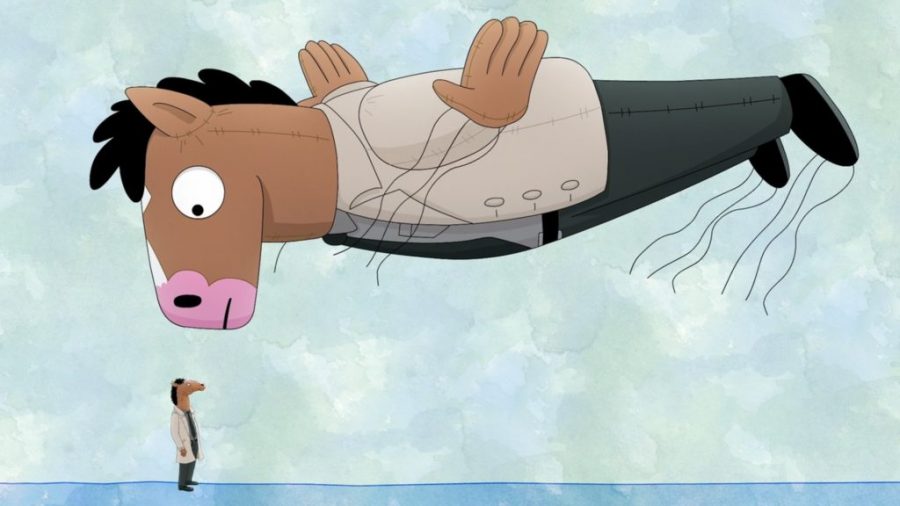BoJack Horseman Season 5 Review
Sep 20, 2018
The existential, nihilist horse is back with a new season on Netflix, and it’s better than ever. This series has the uncanny ability to make you laugh and zone out thinking about your lack of purpose in the universe. You need a strong spine to watch this series, since if you’re easily manipulated, this show will often leave you sad and confused.
The season opens with Bojack working on his new television series “Philbert” and getting progressively more frustrated with the director’s remarks. His producer and ex-agent Princess Carolyn talks some sense into him, and by the end of the episode, his dark, depressed, and alcoholic self has rapidly changed into a socializing, party-throwing celebrity. This change in the main character seemed dramatic, and at the end of the episode, I wasn’t sure if it would last.
The main attraction of this show is how dark the main character is, and a different type of dark from modern television. Bojack isn’t brooding or plodding, he’s depressed, isolationist, mean, an alcoholic, and a very relevant and modern portrayal of mental illness in an adult man (or horse, rather).
This season talked about various contemporary issues, whether that be the passing trend of male feminism, or horrible men in Hollywood not getting any consequences for their actions. It included even more serious discussions like opioid addiction, divorce, and adoption. The main topic that was introduced in the episode “Head in the Clouds” is the fine line between an understandable and a relatable character. Diane’s speech to Bojack in the episode was reminiscent of the show’s creators talking directly to their audience, us. Bojack as a character is not meant to be relatable, he’s a horrible person, who’s done horrible things, and the creators, using Diane as their vessel, express this frustration at accidentally making a character that the audience uses to justify their own horrible actions.
Bojack, later in the episode, defends the show-runners intentions, saying “We’re not glamorizing it that’s the thing. You’re not supposed to like Philbert or agree with the things he does. It’s a TV show, it doesn’t glamorize anything — but maybe it normalizes it.” The very meta discussion takes precedent in the later episodes of the season and seems to be a direct call-out to fanboys of the show, who, instead of simply observing the show, have used the character’s poor actions as a rationale to justify their own.
The season as a whole remained pretty light when compared to the earlier season, which kept a horribly dark tone the entire time. There are still the silly jokes they throw in throughout the show, as well as the relentless tongue twisters. For example: “So a brief capitulation, this is not a room for repudiation or condemnation over string cheese appropriation accusations. Mediation is an invitation for an open conversation. Frustration, de-escalation, and the exchange of information, which, in summation removes any justification for litigation involving this corporation.” This, as well as other silly dialogue that is unnecessary, adds to the humor to the show.
The show’s animation also improved, with the season positioning the characters’ faces in new ways, and also involving a lot more watercolor in their backgrounds. This resulted in some unique shots of animation that are just gorgeous.
The season did its part, once again, in involving some serious conversations and its goofy humor while taking its typical mid-season nose dive into the tragic darkness that causes your jaw to drop. The season, though it didn’t affect me as much as the other ones, was still very well done, and for once it actually ends in a semi-happy ending. Hopefully, the show is already working on a season 6. I give Season 5 of Bojack Horsemen an 8/10.




